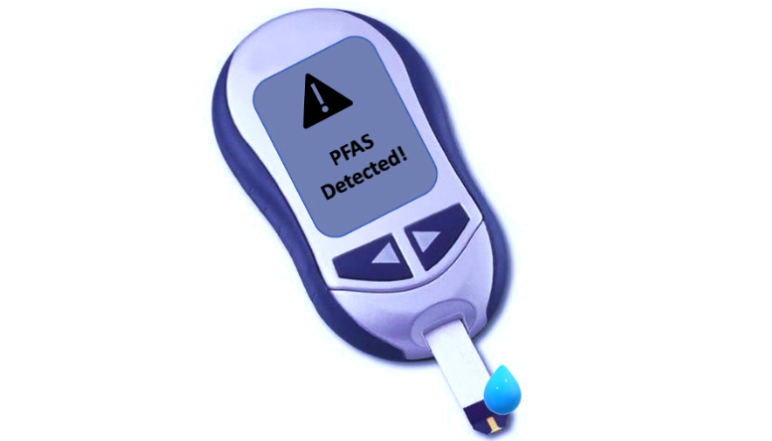Our Research PFAS test kits based on 2D conductive metal-organic frameworks

Artistic illustration of the proposed design for a PFAS test-kit based on 2D metal organic frameworks. Credit – Prof. Gumyusenge
Principal Investigator
Aristide Gumyusenge
- Merton C. Flemings Assistant Professor
- Department of Materials Science and Engineering
Aristide Gumyusenge is an assistant professor of materials science and engineering. His research background and interests are in semiconducting polymers, their processing and characterization, and their unique role in the future of electronics. Notably, he has tackled long-standing challenges in the operation stability of semiconducting polymers under extreme heat and has pioneered high-temperature plastic electronics.
At MIT, his research group focuses on organic materials for smart electronics (OMSE Lab). Through polymer design, novel processing strategies, and large-area manufacturing of electronic devices, he is interested in relating molecular design to device performance, especially transistor devices able to mimic and interface with biological systems.
Headshot photo credit: Gretchen Ertl
Challenge:
Can we design novel materials for reliable and low-cost detection of per- and polyfluoroalkyl substances (PFAS)?
Research Strategy
- Target 2D conductive metal organic frameworks (2D c-MOFs) as material candidates with both promising affinity towards PFAS and low-cost manufacturability
- Use c-MOF thin films to demonstrate cost-effective PFAS test-kits for real-world use
Project description
Per- and polyfluoroalkyls substances (PFAS) have recently emerged as a global health threat making their effective detection and capture extremely important. As these “forever chemicals” continue to be found in various environments worldwide, novel materials and sensing platforms are needed for low-cost and facile sensing and capturing. Metal-organic frameworks (MOFs) are materials that have shown promising affinity towards PFAS. However, recent efforts utilizing these porous polymers for PFAS sensing still face insufficient detection limits and a fundamental understanding of detection mechanisms warrants further investigation for practical use. This project aims to design test kits based on 2D conductive MOFs (2D c-MOFs) films for detecting PFAS in drinking water. The team proposes exploiting these frameworks' inherent porosity and molecular tunability to engineer ultrasensitive surfaces towards PFAS through a computation-guided approach to tune sensitivity and selectivity. The goal is to engineer PFAS test kits that can be deployed for real-world use, especially for low-income households.
Publications
Copper-Based Two-Dimensional Conductive Metal–Organic Framework Thin Films for Ultrasensitive Detection of Perfluoroalkyls in Drinking Water
Heejung Roh, Tyler J. Quill, Gan Chen, Huaxin Gong, Yeongsu Cho, Heather J. Kulik, Zhenan Bao, Alberto Salleo, Aristide Gumyusenge, ACS Nano, 2025
Robust Chemiresistive Behavior in Conductive Polymer/MOF Composites
Heejung Roh, Dong-Ha Kim, Yeongsu Cho, Young-Moo Jo, Jesús A. del Alamo, Heather J. Kulik, Mircea Dincă, and Aristide Gumyusenge, Advanced Materials, 2024
News
Additional Details
Impact Areas
- Water
Research Themes
- Water Purification & Desalination
- Sensors & Monitoring
Year Funded
- 2023
Grant Type
- Seed Grant
Status
- Ongoing

